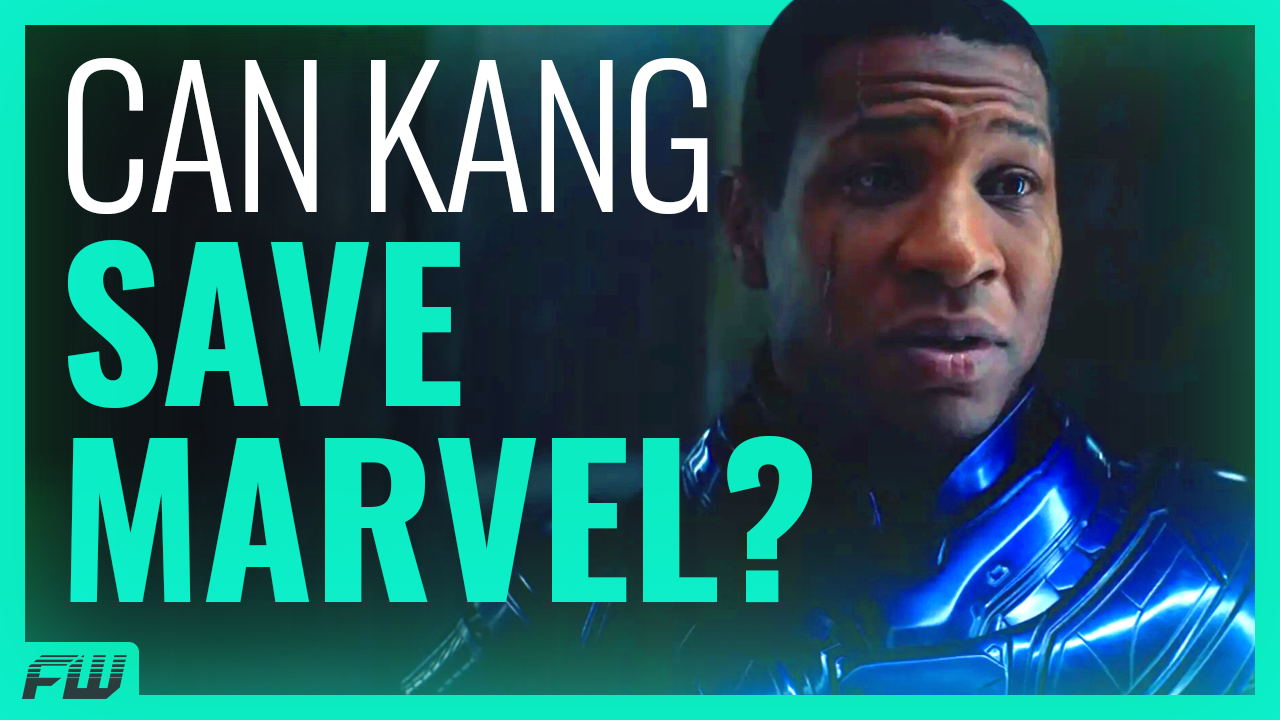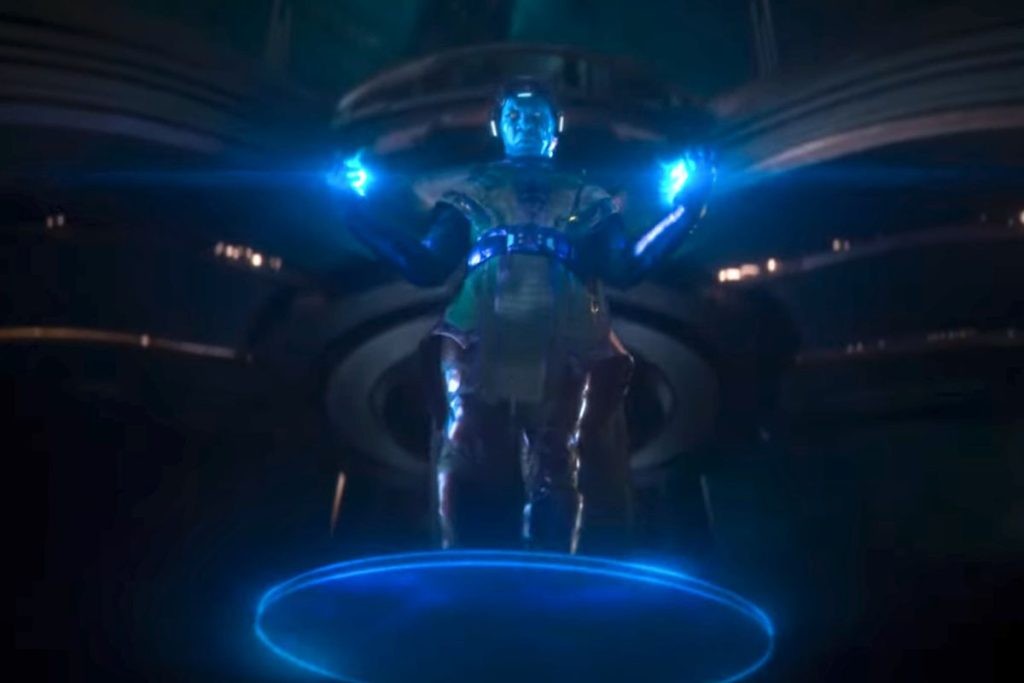In this FandomWire Video Essay, we explain how Marvel’s Kang might be able to fill the villain-sized hole left by Thanos.
Check out the video below:
Subscribe & hit the Notification Bell so you never miss a video!
Can Kang Live Up To Thanos?
The importance of a great villain cannot be understated. Establishing an antagonist with a clear motive is one of the most important elements in storytelling. Heroic characters are all well and good, but how much value do they really have without a well-written foe to challenge them?
There have even been stories in which the villain of the piece outshines the protagonist, going above and beyond the stereotypical evil archetype. Over the years, the greatest villains have proven to be the ones who can shift the audience’s collective perspective to see things from their point of view.
Sure, the brutality of their methods may be questionable, but there are times where their ruthless nature functions to show just how committed they are to achieving their goal. And if that goal is well-defined and logical, then it can be argued that the end justifies the means.
Some examples of layered villains who manage to ride that line between pure evil and somewhat sympathetic can be found within the pages of Marvel comics. This may come as a surprise to anyone not familiar with the comics as many of Marvel’s onscreen villains have been fairly one-note, especially in the early days of the MCU.
There have been a handful of exceptions to that rule in more recent years. Characters such as Erik Killmonger and Xu Wenwu are slightly more sympathetic than villains like Malekith or the Red Skull. However, they still haven’t ever been able to make the audience sympathize with their cause 100%.
Many of them were also killed off too soon. For some odd reason, the MCU movies love to kill off their antagonistic characters before they ever really get the chance to evolve into something more interesting. Perhaps if the actors in those roles were permitted to explore the characters more, it would yield some interesting results. A prime example of this is the character of Loki.
When Loki was announced to be the villain in the first Avengers movie, many Marvel fans scoffed at the idea. Online commenters pondered how this villain who had already been single-handedly defeated by Thor would pose any real threat to Earth’s Mightiest Heroes. Thankfully, Tom Hiddleston was able to deliver in his performance time and time again. He stole almost every scene that he appeared in with a sinister glee.
This was not only enough to cement him as a great universe-spanning villain but also led to him eventually becoming an anti-hero with his own Disney+ series. Unfortunately, by allowing the character to transform into an anti-hero, the MCU lost one of its greatest enemy characters.
The following Avengers villain was fairly unimpressive by comparison. This wasn’t necessarily because James Spader delivered a poor performance as Ultron. It was more down to the writing of the second Avengers movie. In hindsight, it is sort of astonishing that Ultron wasn’t even a significant enough threat to stick around for more than a single movie; especially when you consider the multiple appearances of both Loki and Thanos.
Ultron’s only real legacy left within the Marvel Cinematic Universe is that of Vision. Due to the fact that he was introduced and subsequently killed off within the same movie has rendered him as a somewhat forgettable foe amongst Marvel fans. This is a shame, as he proved to be much more of a threat in the comic book source material.
Whilst Loki and Ultron were significant enough villains to pose a threat to the planet, which the Avengers had to put a stop to, Thanos was a step up from that. Thanos had been teased for six years prior to his official onscreen introduction in Avengers: Infinity War, and he didn’t only pose a threat to planet earth, but to the entire universe.
Thus, a great deal of pressure was put upon Josh Brolin’s shoulders when he took on the role of The Mad Titan. Despite the immense challenge of bringing to life one of the most iconic villains within the medium of comic books, Brolin was seemingly able to pull it off with ease.
He imbued Thanos with a certain humanity which no one predicted. He wasn’t just pure evil, he was a fundamentalist with an unwavering conviction to see his vision through to the end, no matter the cost. Sure, he was willing to quite literally trade the life of his daughter in the name of his cause, but he did so with tears in his eyes.
Brolin was able to portray a fierce internal battle taking place within the soul of a huge, purple, CGI character. That stoically cruel yet heartfelt performance set a new bar for villains within the MCU. And it has not been matched by any other antagonistic character since Thanos’ departure from the MCU.
This is why Jonathan Major’s Kang must live up to that high standard.
Like Thanos, Kang The Conqueror is a cosmic presence within the Marvel comics who threatens the state of the entire universe in the comic book source material. Also similar to Thanos, he is a refugee of a dying world. Instead of being from another planet like Titan, Kang flees his original timeline in order to conquer other points of the space-time continuum.
With that said, he is arguably a less innately sympathetic villain than Thanos. Whilst Thanos is an antagonistic character, he is one filled with grief and PTSD from seeing his planet starve to death. It is his desire to never allow that to happen again which drives his debatably mad goal of wiping out half of the universe.
Whereas Kang started out as more of a scholar rather than a warrior. His superior level of intellect comes with a certain amount of ego and hubris, which the cinematic counterpart of Thanos never explicitly displayed on-screen. His quest to conquer worlds which don’t belong to him wasn’t born out of necessity, simply out of a selfish desire.
He is a formidable opponent, having taken on the Avengers and the Fantastic Four multiple times. He was even able to overpower almost the entire Avengers lineup and take them captive in the comic book story arc, which took place across issues 23 and 24 of the Avengers. He has managed all of this and more over the years, despite not possessing any actual super-human powers beyond the ability to absorb radiation without being damaged.
Instead, Kang’s power lies within his intellect. Over the years, he has used his superior intelligence to not only understand both multiverse travel and time travel, but he is also able to travel across the space-time continuum at will. He has also utilized his mind to create various advanced technological devices, such as his high-tech power armor which he is often depicted wearing.
As he is originally from a future timeline, Kang has a detailed understanding of extremely advanced technology. He is able to utilize tech that Tony Stark can only dream about. Not only that, but due to his time travel capabilities, Kang has complete access to technology from any century which he chooses.
Any Marvel fan worth their salt will be acutely aware that Kang has technically already made an appearance in the MCU after a variant of him appeared in the final episode of Loki and explained that he was responsible for creating the Time Variance Authority in order to prevent a multiversal war.
That variant was subsequently murdered by one of Loki’s variants called Sylvie, although even at the time, it was made pretty clear that this would not be the last time that we would see Jonathan Majors portray a variation of the Kang character. With that said, though, what his appearance in Loki did do was establish that Kang is essentially omnipresent within the Marvel Cinematic Universe, and he essentially always has been.
Even with all of that in mind, access to incredible weapons and technology does not make a great villain. Nor does omnipresence or an insatiable hunger to conquer both the universe that he inhabits as well as those from beyond the multiverse.
What makes a great antagonist is their ability to make you see things from their perspective. Every villain should be the hero of their own story, and Kang The Conqueror should be no different. Whilst it would be very easy for Jonathan Majors to chew the scenery in his next MCU appearance and portray a maniacal supervillain hell-bent on complete domination of the universe, this kind of performance would not hold a candle to what Josh Brolin did with the character of Thanos.
The two villains will undoubtedly be compared to one another by MCU fans; both due to the fact that they are the antagonists of Avengers movie and due to the fact that they are both cosmic-based antagonists. Unfortunately for Jonathan Majors, Josh Brolin left some huge shoes to fill.
Due to the fact that Kang’s motivations are inherently less sympathetic than the character motivations of Thanos, the writers of Avengers: The Kang Dynasty have a significant challenge ahead of them. They must craft a character who is both threatening and scary in certain moments whilst still showing a justifiable reason for his villainous actions. Luckily, they should be able to rely on Jonathan Major’s impressive acting chops to deliver a character with multiple layers of emotion.
Kevin Feige clearly believes that Jonathan Major is up to the task, especially since he gave an interview to Phase Zero during the 2022 San Diego Comic-Con where he went as far as to say, “There’s nobody else’s shoulders I’d rather be putting the Multiverse Saga on.”
Later in the same interview, he expanded his statement to state that; “It’s really impressive what Jonathan Majors is able to do. And all the different incarnations, Variants if you will, of Kang that we will see him do. It’s really pretty cool.”
After singing Jonathan Major’s praises and getting all of us hyped to see his performance as Kang, Feige spoke about one of the greatest things about Kang is how different he is to Thanos, the previous big bad of the universe.
“What I love is that he’s totally different than Thanos. That he’s completely different. That it’s not just, ‘how about a bigger purple guy with a helmet?’ That’s not… you know, that’s not what Kang is. Kang is a very different type of villain, and the fact that he is many, many different characters is what’s most exciting and most differentiates him.”
So, according to the man in charge of the universe, it is wrong to think of Thanos and Kang The Conqueror in the same vein. Regardless, MCU fans will likely still compare the two, but what do you think? Do you feel that Kang will stack up to Thanos’ iconic status as one of the greatest comic book movie villains of all time? Should they even be compared to one another?
Let us know in the comments section below, and thank you for watching in every timeline. Be sure to like the video and subscribe to the channel for more cosmic comic-book content.
Follow us for more entertainment coverage on Facebook, Twitter, Instagram, and YouTube.
Note: If you purchase an independent product featured on our site(s), we may earn a small commission from the retailer. Thank you for your support.


